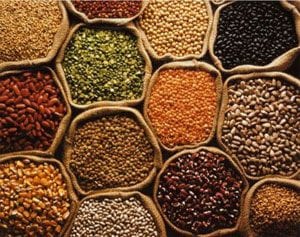Food security is under threat, food habits must change and the industry has a vital role to play in preventing us in the West from “eating up nature.” At least that’s the received wisdom. But even if we agree that the rich West is disproportionately consuming the world’s resources, there’s little consensus on how best to stop our over-consumption. Nutritionist Dr Margo Barker says the sort of tough propaganda messages used in the Second World War successfully hit home and can play a vital role today.
Dr Barker, Senior Lecturer in Nutritional Epidemiology at Sheffield University, says for the sake of food security we in the West must eat less – especially less meat, dairy and processed food. In her view, we’ve become dependent on foods high in protein, fat and sugar at the expense of plants. “Not only does such excess make us overweight and obese, its production contributes to climate change, limits biodiversity, uses up land and wastes water. The message to consumers must be clear and simple: ‘For food’s sake, stop eating up nature.’ ”
Or, maybe, in this era of hashtags, #Ffsstopeatingnature
Learning from the past
She’s not advocating vegetarianism, but cites estimates that it takes the equivalent of around 7 kg of grain to produce 1 kg of beef, 2 kg to produce some herbivorous fish and even less to produce plants.
Using her research into food habits during the Second World War, Dr Barker advocates consumer messages that are straightforward and simple, as opposed to today’s bombardment of confusing advice. For example, Five-a-Day was once judged to be a good example of a clear consumer message, but now even that’s being questioned and has left us wondering whether high-sugar fruits and juices should be included.
In the 1940s, there were simple messages about the health effects of food, which were juxtaposed with advice around eating for beauty and patriotism. But are nutritionists really suggesting that propaganda tailored for the 1940s – an era of world conflict and rationing – can work in 2014?
The rationale for rationing
Dr Barker highlights joined-up thinking on policy, pricing, food production and propaganda in the 1940s. All civilians had a basic ration of fats, sugar, meat and dairy. Bread, fresh vegetables, flour and potatoes were not restricted and prices were kept low to serve as energy mainstays. Food technology was employed to improve nutrient content. Special travel zones limited food transport and reduced food miles.
As the war progressed, more foods were rationed and it continued after 1945. Even bread joined the ration books in 1946 for a two-year period, when there was a world-wide cereal crisis. Monotony, austerity and rationing prevailed until the 1950s, due to continued food shortages as a result of poor harvests, extreme winter weather in 1946/47 and near-famine in other European countries.
“Obviously rationing today would be unacceptable and draconian, but we can certainly learn lessons from those wartime measures,” says Dr Barker.
Adding value
Arguably, we are already doing so. Food industry technologists are producing food that works harder for us, doing more than just filling us up. Products such as Benecol spreads and Beneforté broccoli are designed to stave off human illness and prolong life; crops have inbuilt resistance to pests and diseases. It’s not that far a leap from the 1940s when thiamin was added to flour to combat Vitamin B deficiency and white bread was, in effect, banned in favour of wheatmeal flour, rich in iron and B vitamins.
If nutrition is to act as a munition in a war for food’s security, consumers will need to be far more accepting of the sort of technologies that many scientists believe can safeguard our future diet. The ‘civilian’ population will certainly have to be more compliant too! But people aren’t exactly hanging out the bunting for genetically modified foods – at least, not yet.
For more information
http://www.futureoffood.ox.ac.uk/international-food-conferences
http://futuresconference2013.wordpress.com
Do you agree with Dr Barker? Please email us with your views



